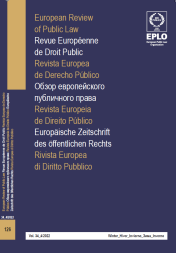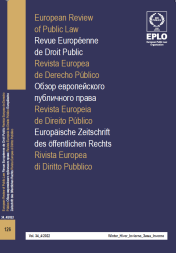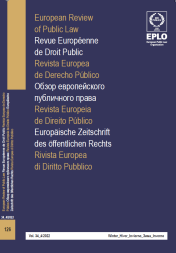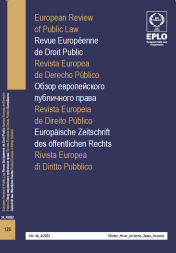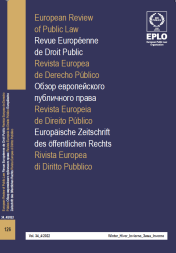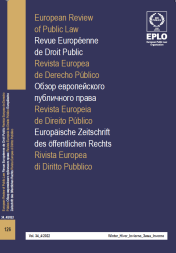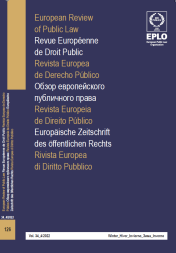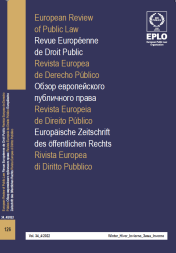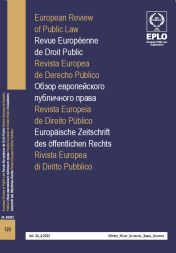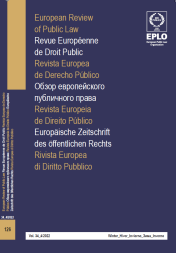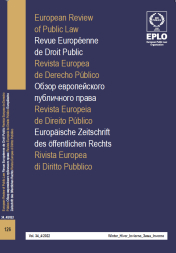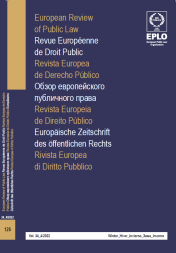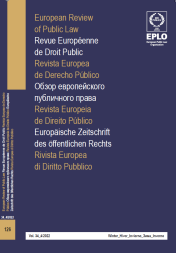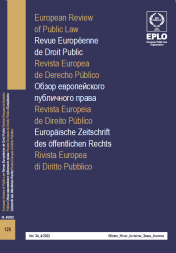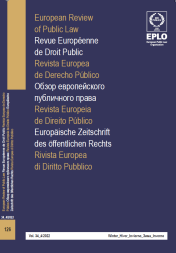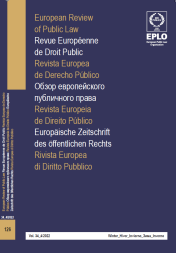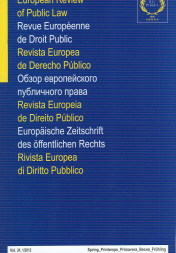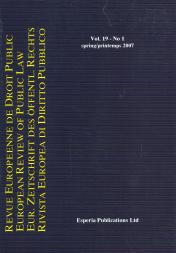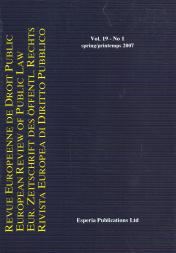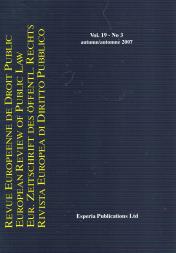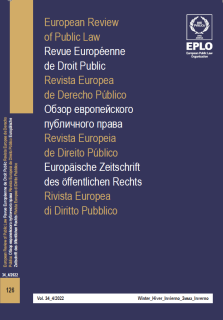
ERPL
vol. 34, no 4, winter/hiver 2022 (126)
This ERPL issue comprises articles and chronicles which examine, as always, topical public law issues covering diverse jurisdictions.
The first article carries out a comparative study on the requirements for recruitment to public posts in the European States, that is, a democratic requirement, which postulates the equality of access to public posts and presupposes the consideration of merit as basis for the recruitment, and a requirement for efficiency, a tool for the professionalization of the civil service, and even more so, for its professionalism. The recruitment modalities reflect in fact the search for an efficient administration, which requires that civil servants responsible for the implementation of its action possess sufficient qualities of professionalism.
The next article addresses the challenges posed by social media platforms by turning to international human rights law (IHRL) and substantiates four arguments justifying the application of state-focused IHRL standards to private platforms: the relevant soft law instruments of the United Nations and the Council of Europe, voluntary acceptance of IHRL standards by certain platforms, states’ positive human rights obligations, and the indirect horizontal effect of IHRL. The article concludes by emphasizing the need to further explore and properly interpret the state-focused IHRL standards in the social media context.
The third article deals with surrogacy and the relevant diverse approaches across the world, from prohibitive to permissive and non-regulating legal regimes with a multitude of approaches to commercial and altruistic surrogacy within these categories. Cross-border surrogacy cases demonstrate a very complex dilemma on the European Court of Human Rights’ role in the European legal order, and it bears examining whether with the rise of cross-border surrogacy cases, it will be feasible to maintain such distinct domestic legislations across States Parties to the Convention, or if the impact of the decisions of the ECtHR will lead to unified human rights standards regarding international surrogacy.
The purpose of the final text in the section of Articles is to honor the memory of a great political scientist who has recently disappeared. The author reflects the debate in a seminar held with Professor Jean Blondel at the European University Institute in the mid-90’s. The seminar dealt with a classical topic, in the form of a dialogue between political scientists and constitutional lawyers, and stressed the strength (and sometimes the weakness) of Anglophilia when examining constitutional issues.
In the section of Chronicles of Constitutional Law, the chronicle coming from Germany reflects the main developments in the field in 2020: The Basic Law was amended in order to make minor changes in the financial relations between the federal government and the Länder; The decision of the Federal Constitutional Court that the Public Sector Purchase Programme of the ECB was ultra vires, although the European Court of Justice decided that it was covered by the mandate of the ECB, caused a sensation throughout Europe; The FCC rejected a complaint claiming that the electoral law for the Federal Parliament must provide for an equal representation of women and men. Finally, among many decisions concerning fundamental rights, the climate protection decision and the approval of the measures taken to fight the pandemic are particularly noteworthy.
The chronicle on the Constitutional Law of the Republic of Latvia (2020-2021) highlights issues pertaining to the administrative territorial reform, which was concluded in 2021. The chronicle then provides an analysis of the case law of the Constitutional Court, where: the legal status of same-sex partners and the understanding of the concept of “family” are dealt with; the conformity of some legal norms of the so-called Istanbul Convention with the Constitution was examined, an explanation was provided and the legal importance of the Preamble of the Constitution was demonstrated. Lastly, case law connected with COVID-19-related restrictions is explained, and the importance of a public holiday in the context of fair remuneration for service is outlined.
In the third chronicle of Constitutional Law, coming from Romania, the author refers to the continuation, in 2022, of the debates on the supremacy versus priority of EU law, this time through the prism of doctrinal approaches. Thus, the relationship between the Constitutional Court of Romania (CCR) and the CJEU, also from the perspective of direct dialogue between representatives of the Courts, and the responsibility of judges for non-compliance with CCR decisions, reflected both in the CJEU jurisprudence and in the legislative changes coming into force at the end of 2022, are addressed. The interpretation and the application of the new regulations in the field of justice and also the CJEU judgments have to be followed, the more so as the CJEU is still vested with preliminary references that call into question decisions handed down by the CCR, in particular a much-disputed decision, also pronounced and published in 2022, regarding the institution of limitations for criminal liability.
Last but not least in the section of Constitutional Law chronicles, the Chronicle of Spain analyzes the constitutional legislation, as well as the main pronouncements of the Constitutional Court in 2021. The second state of alarm due to the COVID-19 pandemic had been in force throughout the national territory until 9 May. From that moment on, the pandemic was legally combated with ordinary health legislation, as well as with the various laws adopted by the Spanish Parliament to combat the pandemic in the social and economic spheres. It is worth highlighting Organic Law 3/2021, of 24 March, on the regulation of euthanasia, which made Spain one of the first states to regulate direct active euthanasia. With regard to the activity of the Constitutional Court, the important SSTC 148/2021, of 14 July, and 183/2021, of 23 October, which declared unconstitutional, respectively, the first state of alarm in force (March-July 2020) and the second state of alarm (October 2020-May 2021), should be highlighted.
In the section of Chronicles of Administrative Law, the first chronicle analyzes the Federal Administrative Court’s first COVID-19 decision rendered in 2022. The Court ruled in many other areas of law – sometimes with media attention – such as the appearance of soldiers in dating apps or the reception of refugees by individual federal states. The judges also focused on environmental rulings, reflecting the legal significance of climate change and its consequences. In addition, the Court clarified specific questions within special subject areas, such as data protection and hunting law.
The second Administrative Law chronicle, coming from Finland, deals with such issues as: the first regional elections in the wellbeing services counties held in 2022; The new Act on Division of Duties between the Chancellor of Justice and Parliamentary Ombudsman which takes the Ombudsman’s job description even more in the direction of the fundamental and human rights commissioner; The government’s proposal regarding automated decision-making in the public administration submitted to the parliament. Furthermore, the COVID-19-related restrictions were still visible in legal practice. The Supreme Court’s new preliminary decision emphasized the advisory responsibility of public authorities.
Next, the chronicle coming from Greece outlines the development of Administrative Law during 2021 through important court decisions and significant laws. Are presented and examined: Law 4797/2021 on state aid to businesses and non-profit organizations in case of disasters, emergency arrangements to support the economy, supplementary state budget and pension arrangement and other emergencies provisions; Law 4820/2021 which reshapes the Rules of Procedure of the Court of Auditors and lays down the compulsory vaccination against COVID-19; decision 770/2021 of the Council of State on the awarding of public contracts and on the pre-trial appeal; decision 2460/2021 of the Council of State on the right to judicial protection of the provision of Article 70 para. 1 of the Civil Code on the possibility of a second appeal in case of rejection of the first for a formal reason; and decision 497/2021 of the Council of State on the application of civil law in the process of issuing an administrative act.
The chronicle on Administrative Law coming from Hungary deals with the modifications in the Code of General Administrative Procedure and the Administrative Court Procedure Code in 2022. The rules of telecommunications devices in administrative procedures have been clarified, a new court dealing with administrative cases has been designated, so that three types of courts can now conduct administrative lawsuits, and the number of persons with ex lege plaintiff rights in the Code of Administrative Procedure has been expanded. A data protection case from the practice of the Constitutional Court is presented, which sheds light on the ex officio interpretation of the powers of the data protection authority. Among the Kúria decisions of general effect, are noteworthy those concerning the initiation of an action for failure to act before an administrative court procedure, the applicability of the principle of legitimate expectation in customs matters, and the Hungarian legal classification of the use of public land procedures.
The next chronicle aims to present selected developments in Polish Administrative Law in three fields: doctrine, jurisprudence and legislation. Among the important developments in doctrine, it is worthy of mention the 12th Scientific Conference of Administrative Law Scholars of Kraków and Wrocław, which was devoted to the so-called unorganized sources of administrative law. In the field of jurisprudence, the focus is on the issue of legality/illegality of introducing limitations for counteracting COVID-19 in the implementing regulations instead of a law. The controversial change in the Polish Code of Administrative Procedure which introduced the annulment of a decision after the lapse of a 10-year period since its service or publication has been the most significant development in the field of legislation as presented in this chronicle.
The few significant developments in Romanian administrative law during the years 2021-2022 are presented in the next chronicle. On the legislative field, the adoption of a new law on anti-doping, and a parliamentary move to minimize bureaucracy deserve special mention. The Constitutional Court issued important decisions meant to correct some normative excesses from the COVID-19 period which were found to be in breach of fundamental rights, and one decision regarding the sanctions to be applied in case of plagiarism. On the interpretation and application of the law, the High Court of Cassation and Justice settled the divergent jurisprudence regarding the scope of the objection of illegality in administrative litigation.
The 2022 Chronicle coming from Serbia concerns legislative changes to the General Administrative Procedure Act (GAPA), following a decision of the Serbian Constitutional Court that declared Article 178, paragraph 3 on the objective deadline for reopening administrative procedures unconstitutional and incompliant with ratified international treaty obligations. The Constitutional Court found the existence of a five-year deadline from issuing a final (non-appealable) administrative act, to request reopening of the procedure based on the subsequent decision of the Constitutional Court or the judgment of the European Court of Human Rights in the same administrative matter, to limit the right to an effective remedy as guaranteed by the Constitution and the European Convention on Human Rights.
Last but not least in the section of Administrative Law chronicles, the legislative activity in Spain has certainly been intense, both in terms of quantity and quality, during 2022. In particular, 15 organic laws, 39 ordinary laws and 20 Royal Decrees have been approved, which, in total, represent 74 legislative initiatives approved that year, and, in addition, of the most varied subjects, from the protection of fundamental rights, such as equality or the right to vote abroad, to the regulation of the most varied areas, such as vocational training, sport, the circular economy and dumping, telecommunications, public policies, science, democratic memory, gambling,... This allows us to say that a certain normality has been restored, characterized by the regulation of specific material areas and not by the immediate and urgent response to the needs arising from the COVID-19 pandemic.
This ERPL issue is concluded by an Analytical Table of the contents of all four ERPL issues of the year 2022.
P. Gonod, Civil Service Recruitment in Europe: Elements of comparaison [IN FRENCH] (27 pp.)
P. Burdiak, What’s Old is New Again: An International Law-based Approach to Social Media Content Governance [IN ENGLISH] (27 pp.)
L. Garayová, Cross-border Surrogacy in the Practice of the European Court of Human Rights [IN ENGLISH] (16 pp.)
L. M. Díez-Picazo, Jean Blondel and the State [IN ENGLISH] (6 pp.)
I. Constitutional Law
Th. Gross, Federal Republic of Germany [IN GERMAN] (13 pp.)
A. Kārkliņa / A. Rodiņa / K. Pētersone, Republic of Latvia [IN ENGLISH] (45 pp.)
M. Safta, Romania [IN ENGLISH] (15 pp.)
F. M. García Costa, Spain [IN SPANISH] (27 pp.)
II. Administrative Law
M. Brenner / D. Wunderlich, Federal Republic of Germany [IN GERMAN] (32 pp.)
K. Kuusikko, Finland [IN ENGLISH] (26 pp.)
M.-E. Ioannou, Greece [IN ENGLISH] (32 pp.)
Cs. Molnár, Hungary [IN ENGLISH] (15 pp.)
J. Człowiekowska, Poland [IN FRENCH] (18 pp.)
T. Chiuariu, Romania [IN ENGLISH] (11 pp.)
B. Todorović, Serbia [IN ENGLISH] (13 pp.)
A. Villanueva Cuevas, Spain [IN SPANISH] (40 pp.)
Analytical Table (4 pp.)













